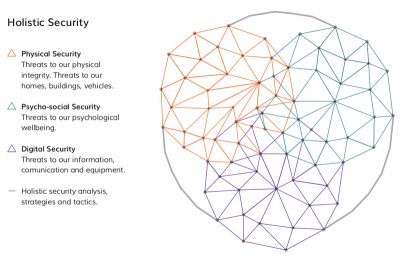 Building on their work on the Holistic Security Manual the training team have designed this week long immersive training to share their integrated approach to digital, physical, and psycho-social security for individuals and organisations.
Building on their work on the Holistic Security Manual the training team have designed this week long immersive training to share their integrated approach to digital, physical, and psycho-social security for individuals and organisations.
Security issues affect those working on many issues: LGBTI and gender rights, environmental and human rights, anti-corruption work and other forms of social or political organising. Individuals and organisations can find themselves targeted for personal, economic and societal attacks by adversaries. The development of electronic surveillance mechanisms poses a growing threat. Security and protection can easily become important at home, at work and while carrying out organising activities.
This training will help you to take an organised approach, to build strategies to maintain well-being and to protect spaces for activism and resistance – whether working alone, in small groups, collectives or organisations. This training takes a holistic approach that integrates various aspects of security including psycho-social, digital and physical security.
The concept of a ‘holistic’ approach to security and protection for activists arose from a collaboration and exchange of best practices between trainers and practitioners working on the security and protection of human rights defenders. This included psycho-social well-being and ‘integrated security’ approaches; security management and risk analysis; and digital security. After years of exchanges, a sense emerged that an integrated approach is necessary in order to facilitate a more positive and rounded improvement in security and protection practices among activists and human rights defenders at risk. This Holistic security training is one of the fruits of that exploration.
The aims of a holistic approach to security and protection of activists and HRDs include:
• Fortifying the sustainability of activism in the context of violence (broadly and intersectionally understood)
• Fortifying activist’s capacities to reflect, learn and take preventive measures to improve their security and protection
• Fortifying activist’s resilience and abilities to respond creatively during times of ‘crisis’.
The training will have three dimensions:
Creating Space: Security and Radical Well-being
This dimension will support participants to reclaim security as a subjective and personal concept. We will explore the closing space of work for activists in their context (law, violence, technology, and impact through gender, race, ethnicity, sexual orientation, etc ). Starting with defining psychological responses to threats, we will build an understanding of responses to risk and the impact of stress and trauma on security. We will explore self-care and well-being as a political tools in political struggles, along with the importance of mobilising inner resources and solidarity while improving security in groups and organisations.
Exploration: Analysis and Planning for Security
This aspect of the training will enable participants to become familiar with and able to use the following tools in order to analyse their security situation and take appropriate action:
• situational monitoring and analysis (of the Political, Economic, Social,
• technological, Legal and Environmental trends)
• mapping their assets and information
• actor mapping, identifying allies and adversaries
• analysing and sharing security indicators/’incidents’
• threat analysis and prioritisation.
In addition, participants will:
• become familiar with overall principles of security strategising
• understand a framework and challenges for security
• get to know key aspects of advocacy and network-building for security
• explore the key aspects of emergency planning.
Taking Action: Hard skills for protection
Once the appropriate needs have been identified, a range of skills can be developed. These can include:
Digital Security
• Digital ‘risk analysis’
• Device maintenance and hygiene
• Storing and deleting sensitive information securely (concepts and software)
• Tools for more secure communication (concepts and software)
• Tools for circumventing censorship and maintaining privacy
• Fundamentals: how the mobile network works
General security skills
• Principles of building an effective support network
• Advocacy for security in practice
• Creating security plans and strategies
• Principles of non-violent action
• Emergency response and reporting
Self-care and well-being
• Understanding stress, burnout, compassion fatigue and vicarious (secondary) trauma
• Tools and techniques to stay safe and well (relaxation, health, stress management)
• Community as a support system in social justice organizing
Tools for Holistic Security can be employed in service of the following concrete goals:
• Creation of a positive, constructive culture of care, awareness, analysis and consensus which leads to effective decision-making with regard to well-being and security and, ultimately, the sustainability of their work in transforming the structures which limit their space for work.
• Creation of policies and agreements, based on an analysis of the security situation (understood holistically) and the mobilisation of available resources – from the technological to the emotional and philosophical.
• Identifying and fostering focal points or ‘champions’ who, by the end of the project, have the necessary capacities and mandate to synthesize, fortify and update institutional or communal best practices independently.
• Identifying and implementing the structural, and technical changes or tools necessary in order to improve security.